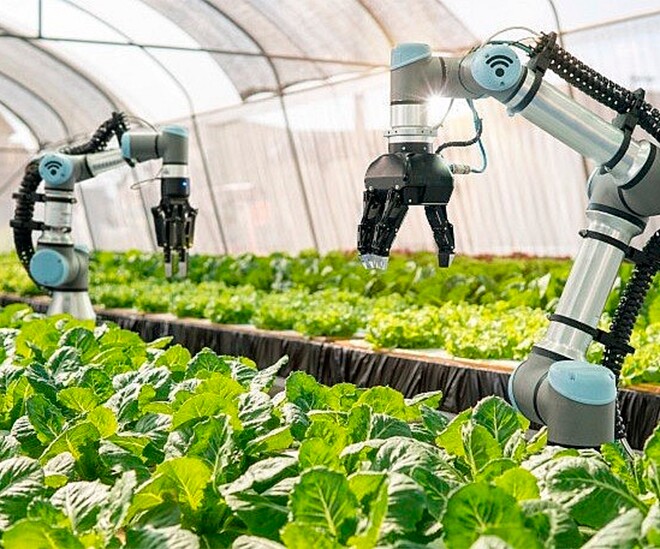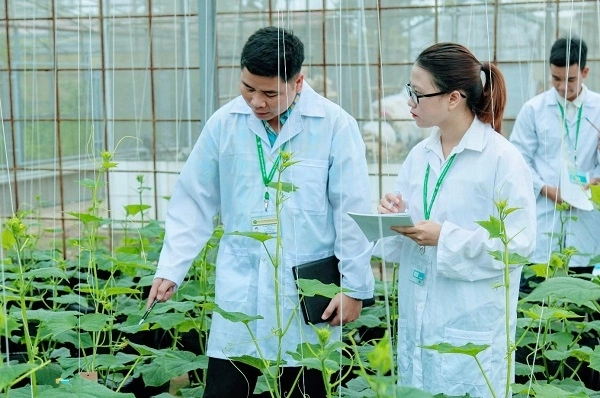The High-tech Agriculture industry is an innovative and strategic field of study that combines traditional agricultural sciences with cutting-edge technological advancements. It integrates biotechnology, automation, artificial intelligence (AI), the Internet of Things (IoT), environmental sensors, and Big Data to revolutionize agricultural production, making it smarter, more sustainable, and efficient.

In recent years, the curriculum in High-tech Agriculture has been designed to address modern agricultural challenges such as labor shortages, low production efficiency, environmental pollution, and, most importantly, dependence on natural conditions. Instead of relying solely on traditional farming methods and experience, students and workers in this industry are trained to approach agriculture with a technological mindset and a systematic production process.
This interdisciplinary field of study encompasses engineering, technology, biology, and management, providing students with a comprehensive understanding of modern agricultural production.
As the world grapples with climate change, population explosions, and increasing demands for safe food, High-tech Agriculture has become a crucial trend. In Vietnam, the shift from traditional agriculture to technology-driven agriculture is an essential step towards enhancing the value of agricultural products, increasing productivity, and improving the quality of life for farmers.

Moreover, today’s agricultural market demands not only high yields but also traceability, food safety, and sustainability in production. Only advanced production models with stringent quality control and integrated technology can meet the requirements of both domestic and international markets.
Attractive Career Opportunities, Yet Understaffed
The curriculum for the High-tech Agriculture program is designed to be interdisciplinary, ensuring that students gain a solid foundation in agricultural sciences while also acquiring modern technological skills applicable to agricultural production and management.
Students will learn about the biological characteristics of crops and livestock, modern cultivation and care techniques, and how to optimize resources such as water, soil, and fertilizers using smart methods. In addition to technical knowledge, students will develop soft skills such as systems thinking, agricultural project management, entrepreneurial mindset, and innovation capabilities in the context of Agriculture 4.0.
With their broad knowledge base and flexible technological application skills, graduates of this program have numerous career opportunities. They can find employment in high-tech agricultural enterprises, corporations specializing in seed production, fertilizers, animal feed, or agricultural product export companies.

Popular job positions include smart farming engineers, high-tech farm development and management specialists, digital transformation consultants in agricultural production, technical staff in research centers for crop and livestock breeding, or agricultural data analysts.
Additionally, students can participate in agricultural development projects funded by the government or international organizations or choose to embark on entrepreneurial ventures with smart farm models, urban agriculture, soilless cultivation (hydroponics, aeroponics), or clean food production. Those with a research orientation or plans to pursue higher education can find opportunities in institutes, universities, or development organizations.
The starting salary for this industry is approximately 9-12 million VND, increasing to 15-20 million VND after 2-3 years. The average income for agricultural engineers can exceed 32 million VND per month.
In 2023, out of nearly 547,000 university entrants, only 0.86%, or 4,700 students, chose the field of Agriculture, Forestry, and Fisheries. For several years, the Ministry of Education and Training has assessed this field as underperforming in terms of student enrollment.
According to PGS.TS Tran Van Quang, Head of the Faculty of Agriculture, Vietnam Academy of Agriculture, many people still associate agricultural studies with working in muddy fields and spraying pesticides. This perception is outdated as agricultural education now focuses on high-tech applications.
In addition to the Vietnam Academy of Agriculture, several other institutions offer programs related to High-tech Agriculture, including the University of Agriculture and Forestry in Ho Chi Minh City, Thai Nguyen University, Hue University, and Forestry University. The typical admission score for these universities ranges from 15 to 22, based on the method of evaluating high school graduation exam results.





























